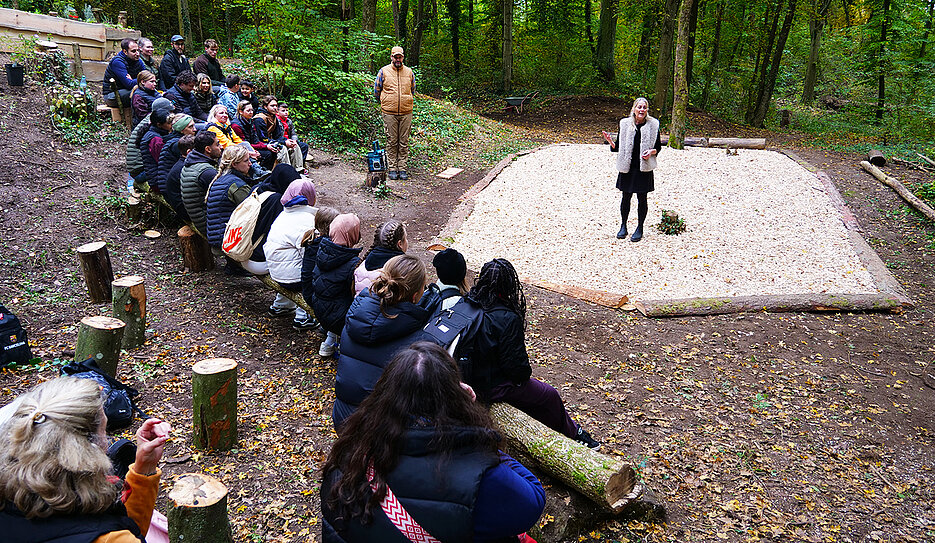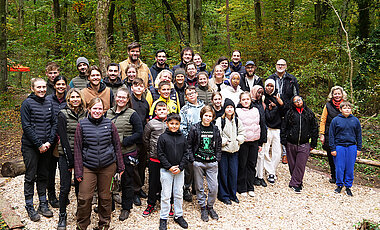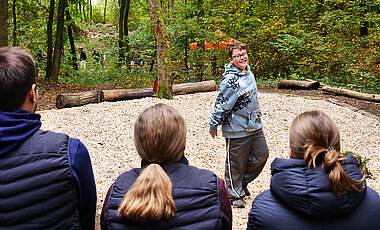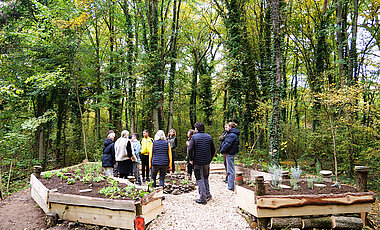School Lessons outside in the Forest
10/21/2025German, English and maths in the forest? This becomes reality once a week for a class at Würzburg-Heuchelhof secondary school. A research team from the University of Würzburg set out to analyse this form of teaching.

It's no secret that more and more children and young people in Germany are getting too little exercise, spending more and more time with digital media and sometimes exhibiting mental health problems. Teachers are also feeling the pressure. Stress, noise and lack of exercise characterise everyday school life. An innovative approach is now increasingly coming into focus - outdoor lessons promise relief and new impetus for learning and well-being.
For a sixth grade class at the Würzburg-Heuchelhof secondary school, the forest now becomes a classroom with a school garden, atrium and toilet once a week. The construction was carried out by 17 managers from Siemens AG together with the Schutzgemeinschaft Deutscher Wald (SDW) Landesverband Beyern and student assistants from the Chair of Special Education for People with Learning Disabilities at Julius-Maximilians-Universität Würzburg (JMU). The pupils were officially presented with their new teaching location on 16 October 2025 by Simon Tangerding, SDW Managing Director for the Bavarian regional association.
Analysing Outdoor Lessons on Camera
The JMU Chair of Special Education for People with Learning Disabilities is involved in the project. It is focussing on the pupils' lessons. And it does so with a camera. "In our project, we are filming the children's lessons outdoors in order to be able to analyse the special teaching and learning situation of outdoor lessons," explains Professor Stephan Ellinger, Head of the Chair and project manager together with his colleague Lukas Kleinhenz.
But that's not all: the team is also filming standard classroom lessons one day a week. This allows them to compare the two situations over the 2025/2026 school year. "There are several questions for us, including: How will teaching change? What happens to learning? Are pupils possibly more easily distracted? Or do they seem less stressed and allow nature to speak to them in a certain way? How do they and the teachers deal with the new situation?" says Kleinhenz.
Offering Outdoor Lessons as an Alternative Form of Teaching
The researchers did not set any fixed parameters in advance, such as the number of pupil putting their hands up, for analysis. They are conducting qualitative research: "It's important for us to approach the matter with an open mind," says Ellinger. The aim is to transcribe and analyse the video material and describe the situation in detail.
After analysing the footage, the aim is to develop a concept for outdoor lessons. "We want to use our findings to enable teachers to offer outdoor lessons as a reliable alternative form of teaching," says Kleinhenz. The researchers want to present the concept on a website together with partners from the Technical University of Munich.
About the Joint Project
The JMU project is part of the joint project "Die Bedeutung gesundheitsrelevanter physischer und psychischer Wirkmechanismen im Unterricht in Naturräumen". The Federal Ministry of Agriculture, Food and Regional Identity is funding this with over one million euros for the period from 1 October 2024 to 30 September 2027. The cooperation partners are JMU, the Technical University of Munich and the Schutzgemeinschaft Deutscher Wald Landesverband Beyern. Several schools throughout Germany are also involved - the majority in Bavaria.
The JMU sub-project runs under the name "Lernraumanalyse im Kontext des Lernens, Lehrens und der sozialen Interaktion unter besonderer Berücksichtigung von Ausdrucksgestalten schulischen Resonanzerlebens". The research team is cooperating with three schools in Lower Franconia:
- Würzburg-Heuchelhof secondary school
- Pestalozzi School Hösbach
- Adolph-Kolping-School Würzburg
At each school, the team is investigating different forms of outdoor teaching: at the secondary school, lessons take place in the forest, in Hösbach in the school garden on the school grounds and at the Kolping School around a construction trailer provided in a nearby open space.
To the website of the sub-project
Siemens AG was involved in setting up the forest classroom as part of the company foundation, which was founded in 2008 as an independent, non-profit organisation. Since then, it has been realising projects that contribute to sustainable social development.
Further information on the Siemens Foundation
Contact
Prof Dr Stephan Ellinger, Head of the Chair of Special Education for People with Learning Disabilities, T. +49 931 31-85486, stephan.ellinger@uni-wuerzburg.de
Lukas Kleinhenz, Chair of Special Education for People with Learning Disabilities, T. +49 931 31-87724, lukas.kleinhenz@uni-wuerzburg.de
Additional images









